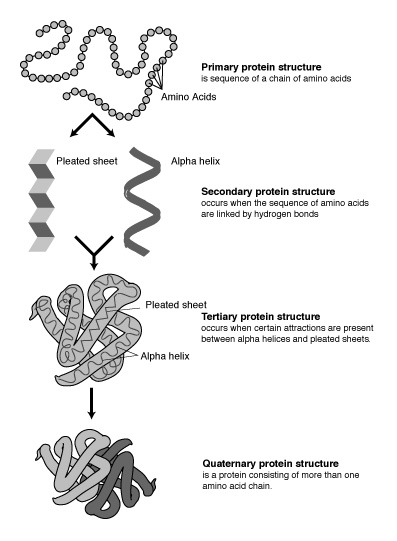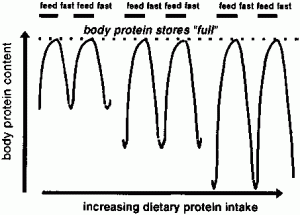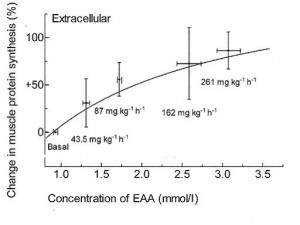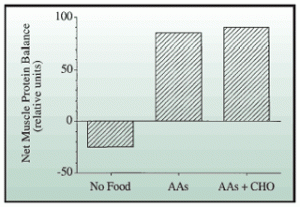Dietary protein…it’s one of the most important topics when it comes to your physique and making improvements to it.
If you’ve ever wondered what it is, why it’s so important, and how much you should be eating, check out this article.
What are proteins?
Proteins are organic molecules made up of amino acids – the building blocks of life. These amino acids are joined together by chemical bonds and then folded in different ways to create three-dimensional structures that are important to our body’s functioning.

There are two main categories of amino acids in the body. First, we’ve got essential amino acids – those that the body can’t manufacture, and thus we must consume in our diets.
Some amino acids are conditionally essential, which means that our bodies can’t always make as much as we need (for example, when we’re under stress).
Next, kinda obviously, we’ve got nonessential amino acids – those that the body can usually make for itself.
| Essential amino acids | Conditionally essential amino acids | Nonessential amino acids |
|---|---|---|
|
|
|
Why is it important to get enough protein?
During digestion, the body breaks down the protein we eat into individual amino acids, which contribute to the plasma pool of amino acids. This pool is a storage reserve of amino acids that circulate in the blood.
The amino acid pool in the bloodstream readily trades with the amino acids and proteins in our cells, provides a supply of amino acids as needed, and is continuously replenished. (Think of it like a Vegas buffet of protein for the cells.)
Since our bodies need proteins and amino acids to produce important molecules in our body – like enzymes, hormones, neurotransmitters, and antibodies – without an adequate protein intake, our bodies can’t function well at all.
Protein helps replace worn out cells, transports various substances throughout the body, and aids in growth and repair.
Consuming protein can also increase levels of the hormone glucagon, and glucagon can help to control body fat.1 Glucagon is released when blood sugar levels go down. This causes the liver to break down stored glycogen into glucose for the body.
It can also help to liberate free fatty acids from adipose tissue – another way to get fuel for cells and make that bodyfat do something useful with itself instead of hanging lazily around your midsection!
How much protein do you need?
How much protein you need depends on a few factors, but one of the most important is your activity level.
The basic recommendation for protein intake is 0.8 grams per kilogram (or around 0.36 g per pound) of body mass in untrained, generally healthy adults. For instance, a 150 lb (68 kg) person would consume around 54 grams a day.
However, this amount is only to prevent protein deficiency. It’s not necessarily optimal, particularly for people such as athletes who train regularly and hard.
For people doing high intensity training, protein needs might go up to about 1.4-2.0 g/kg (or around 0.64-0.9 g/lb) of body mass.2 Our hypothetical 150 lb (68 kg) person would thus need about 95-135 g of protein per day.
These suggested protein intakes are what’s necessary for basic protein synthesis (in other words, the creation of new proteins from individual building blocks). The most we need to consume throughout the day for protein synthesis probably isn’t more than 1.4 – 2.0 g/kg.
But wait – there’s more!
Beyond the basics of preventing deficiency and ensuring a baseline of protein synthesis, we may need even more protein in our diets for optimal functioning, including good immune function, metabolism, satiety, weight management and performance.3 In other words, we need a small amount of protein to survive, but we need a lot more to thrive.
We can only store so much protein at one time. As the graph below shows, the body’s protein stores fluctuate over the course of a day. Notice how the upper limit never increases; the amount of protein in the body just cycles up and down as we eat or fast.

The take-home here is that you can’t simply eat a 16-pound steak (a la Homer Simpson consuming “Sirloin A Lot”) once and be done with it. The body needs its protein stores to be continually replenished, which means that you should consume moderate amounts of protein at regular intervals – which just happens to be an important Precision Nutrition guideline.
Consuming more protein may help maintain an optimal body composition (in other words, help you stay leaner and more muscular) and a strong immune system, good athletic performance, and a healthy metabolism. It may promote satiety (i.e. make you feel full longer) and consequently help you manage your body weight.
Indeed, physique athletes such as bodybuilders have long relied on the rule of 1 gram of protein per pound of body weight – or 150 g per day for a 150 lb individual.
For extra credit
When you eat protein is just as important as how much. After resistance exercise (RE) such as weight training, the body synthesizes proteins for up to 48 hours after training.4
Interestingly, during and immediately after RE, protein breakdown is increased as well. In fact, for a brief period, the rate of breakdown exceeds the rate of building.
The body actually drops into a short-term wasting or catabolic state. However, taking in enough protein during the pre- and post-exercise period can offset catabolism. (Check out the Precision Nutrition guide for more on nutrition timing.)
The graph below shows that as the blood concentration of essential amino acids (EAA) increases, so too does protein synthesis.

The graph below shows how amino acid (and amino acid + carbohydrate) consumption after exercise results in a positive muscle protein balance (in other words, helping muscles rebuild, which is a good thing), while the intake of no nutrients can result in a negative muscle protein balance.

Which protein is best? In general it’s your choice – both protein from plant sources and animal sources seem to work equally well in increasing muscle protein synthesis as a result of exercise.5 The amino acid leucine seems to act as a major stimulus for protein synthesis; good sources of leucine include spirulina, soy protein, egg white, milk, fish, poultry, and meat.
Can I eat too much protein?
If you overeat protein, this extra protein can be converted into sugar or fat in the body. However, protein isn’t as easily or quickly converted as carbohydrates or fat, because the thermic effect (the amount of energy require to digest, absorb, transport and store protein) is a lot higher than that of carbohydrates and fat.
While 30% of the protein’s energy goes toward digestion, absorption, and assimilation, only 8% of carbohydrate’s energy and 3% of fat’s energy do the same.
You might have heard the statement that a high protein intake harms the kidneys. This is a myth. In healthy people, normal protein intakes pose little to no health risk. Indeed, even a fairly high protein intake – up to 2.8 g/kg (1.2 g/lb) – does not seem to impair kidney status and renal function in people with healthy kidneys.6 In particular, plant proteins appear to be especially safe.7
Summary and recommendations
- For basic protein synthesis, you don’t need to consume more than 1.4 to 2.0 g/kg (around 0.64-0.9 g/lb) of protein per day.
- Nevertheless, consuming higher levels of protein (upwards of 1g per pound of body weight) may help you feel satisfied after eating as well as maintain a healthy body composition and good immune function.
- You should consume some protein before and after training to ensure adequate recovery.
References
Click here to view the information sources referenced in this article.
If you’re a coach, or you want to be…
You can help people build sustainable nutrition and lifestyle habits that will significantly improve their physical and mental health—while you make a great living doing what you love. We'll show you how.
If you’d like to learn more, consider the PN Level 1 Nutrition Coaching Certification. (You can enroll now at a big discount.)


Share